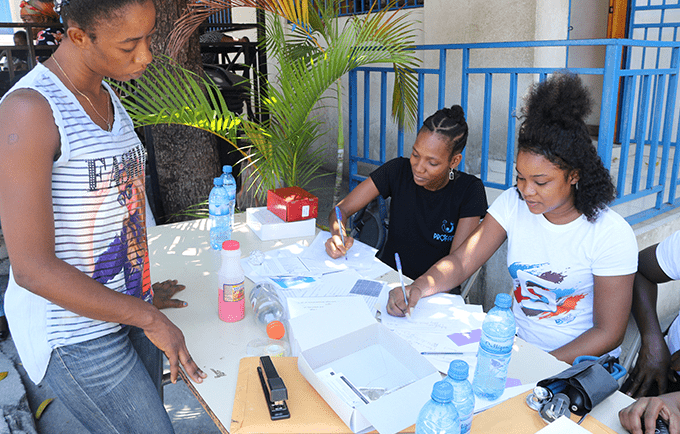The United Nation Agency for Reproductive Health, donated to the Haitian government through the Department of Public Health and Population 9 out of 10 condoms distributed in Haiti in 2020, for an amount greater than 315,000 US dollars.
Several of the beneficiary health care institutions along with other family planning and maternal health providers distributed them to the public during awareness-raising, facilitation, and mobilization activities.
Adeline’s experience at a mobile clinic
Adeline resides in Font Ramier in the municipality of Chansolme, North-west of Haiti, her economical condition is quite precarious, she’s at her sixth pregnancy with 5 living children. In 2020, she gave birth to triplets who did not survive.
« I had made only one prenatal visit when I was 2 months pregnant and I never set foot in a hospital after that says Adeline, stating that it was like that for all her previous pregnancies
The mobile clinic is part of a strategy to promote the reduction of maternal and neonatal mortality in Haiti. It provides prenatal care, family planning and other essential services in areas without health facilities
Condoms and Covid-19
Despite the Covid-19 pandemic, UNFPA has supported the distribution of over one million condoms in Haiti in 2020 during awareness-raising sessions on HIV prevention, sexually transmitted infections (STI), early and unwanted pregnancies, says its Representative in Haiti. Universities, civil society organizations, LGBTQ organizations (lesbian, gay, bisexual, transgender, queer and more), also Town Halls had received them, explained Yves Sassenrath. More than 4,000 adolescents and young people have been directly affected by the prevention of HIV and STIs and 350 LGBT and transgender people (TS) have been sensitized.A fairly popular method in Haiti
Male condoms are the most popular methods among single and sexually active women, according to the results of the Mortality, Morbidity studies, uses of services (EMMUS-VI, 2016-2017). Condoms prevent both pregnancies and transmission of infections, including HIV.
According to UNFPA, teenage pregnancy is a concern because in most cases it prevents women from developing their full potential to fully participate in the process of building a prosperous society. In Haiti, 10% of girls aged 15-19 have already began their procreative life. More than 50% of adolescent girls do not have access to a method of contraception they would like. Several of the beneficiary health care institutions provided during community activities such has awareness-raising, animation and mobilization.
Other activities to promote family planning/contraception
For FOSREF, Foundation for Reproductive Health and Family Education, awareness-raising activities refer to exchange of information on topics of concern to young people, as human immunodeficiency virus (HIV) testing, drug use prevention, teenage pregnancies, violence and family planning awareness, as confirmed by the Communication officer.
Activities of animation refer to group workshops where the leaders join associations who organize such activities, added Eddy Raymond. While those of mobilization took place around the links between Covid-19 and other aspects (HIV, narcotics, for example) treated by associations partnered with FOSREF
FOSREF distribute condoms to youth and to young men who have sexual relations with other men (HARSA) during those activities held in various neighborhoods and communities of the different geographical departments
Family planning and maternal health inputs
Adeline who testified above, followed the advices of health professionals who manage the mobile clinic in Fond Ramier by adopting a family planning approach.
Contraceptive prevalence has increased since 2005-2006, however, it has made very little progress between 2012 and 2016-17 going from 31% to 32%.
At mobile clinics, buckets and cloth masks were distributed under the Covid-19 prevention and protection provisions.
Apart from condoms, UNFPA helped the government to provide to health institutions with family planning and maternal health inputs in 2020 for an amount of approximately US$700,000
The Ministry of Public Health and Population ensures, through the Department of Family Health, the distribution of inputs through the Departmental health directorates and centers for input supplies centers (CDAI), recalls Dieuseul Esprit- Saint, Logistical manager of Reproductive Health Inputs.
Miss Engreend Pyram is the Executive Coordinator of the Reproductive Health program in the Central Plateau Health Department. She is pleased with the availability of inputs in her department. Based on a quarterly report submitted to the Family Health Directorate, she usually receives 10,000 Depo Provera and appropriate syringes for the same period, 144,000 stocks of condoms, 600 jadelle with 2 implants, 3 crates of 144,000 microbial fights. 6 crates of 720 Microgynon, approximately 200 boxes of 2 emergency tablets for 200 customers, 100 IUD per year and also maternal health input iron, folate, ampicillin).
In addition to distribution in their health institutions, they also received additional stock of planning and maternal health inputs upon request for mobile clinics as an advanced strategy to improve maternal health in Haiti, says Magaline Pierre, Executive Coordinator for Reproductive Health Program at the South Department Directorate
Importance of Family Planning
Voluntary family planning has enabled people of child-bearing age (15-49) to better manage their lives and families, limiting and spacing pregnancies, and young people to make informed choices in family planning, says Miss Anette Pierre Simoon, Head of Reproductive Health program at the West Department Directorate.
To justify the importance of family planning, Profamil Director, Dr Gianni De Castro recalls, among other things, about unwanted pregnancies that need to be prevented as well as abortions in poor conditions, one of the highest cause of maternal mortality in Haiti, 529 deaths per 100,000 live births. According to EMMUS-VI, among women aged (15-49), 4% reported having had an abortion, at least once in their lifetime.
Story and photo : Vario Sérant


